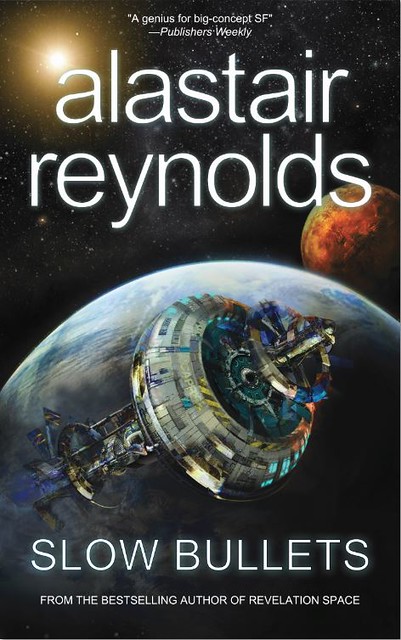Let me repeat a brief paragraph that I wrote at the beginning of that June 8 blog post: If you are unfamiliar with the various works of author Alastair Reynolds, then Slow Bullets would be the perfect starting point. If you read Alastair Reynolds already, preferring his longer novels and series work -- still, don't deny yourself the pleasure of reading this story, as Slow Bullets has more ideas than some novels that are twice its length.
And if you doubt, or question, my words, here's a few excerpts from the very lengthy review of Slow Bullets from the Los Angeles Review of Books. The review, by Stan Hunter Kranc, is entitled "The Persistence (and Failure) of Memory":
Alastair Reynolds's Slow Bullets opens with poetry and a war crime.
The poet is Giresun, the fictional poet laureate for the Central Worlds, one side in a bloody sectarian conflict. Although the novel's narrator, a former soldier called Scur, fought instead for the Peripheral Systems (where reading the enemy's "propaganda" was illegal), the poet was especially meaningful to her family and to the soldier herself as a link to long-lost loved ones.
The war crime is perpetrated at the conflict's end: Scur grimly reports her own capture and subsequent torture by a group of renegade soldiers, led by the infamous war criminal Orvin. Though the details evoke a rape, the instrument of Scur's torment is technological: the slow bullets that give the novella its name.
Readers unfamiliar with the larger body of the Reynolds's work — a dozen novels and an impressive number of short stories, novellas, and collections — may be startled by the prose, which is disarmingly clinical, punctuated by instances of visceral phrasing. Some readers may find themselves thrown off balance by the juxtaposition of beauty and ugliness — or by the abrupt shift in circumstances that immediately follows: Scur awakens on an apparently derelict ship, surrounded by feuding soldiers from both sides of the conflict, and with no memory of how she came to be there. Readers familiar with Reynolds's work, however, will know that these two threads must be intertwined. Reynolds is practiced in tying together apparently unrelated elements, and by the end of the story, the text irrevocably links bullet and poet.
...
Slow Bullets, however, marks a development in Reynolds's writing. As a storyteller, we see him experimenting with both the form and manner of narrative. We come to understand that the text's "flaws" (that it is often repetitive and sometimes obtuse) are deliberate artifacts of its narration, a glimpse into the inner workings of Scur's mind and motivations. As a writer, we see a more overtly thoughtful work examining the philosophical, technological, and social issues of memory. Most immediately, Scur is haunted by memories of lost family, Giresun's verse, and Orvin's torment. The war criminal is hiding somewhere aboard the ship, and Scur's quest for vengeance quickly draws in others. However, Orvin is not the only such criminal. With the exception of the hopelessly outnumbered ship's crew and civilian population, all aboard are dressed identically, and although it is known some are honest veterans and some are prisoners, the ability to distinguish friend from foe and good from wicked is a separate problem of memory.
...
Like so much of Reynolds's other writing, the message of Slow Bullets is ultimately ambivalent. Although Reynolds excels at weaving different threads together, his knots are convoluted, difficult things. Again, were this an "old" space opera, Scur's exploits in unifying the crew and forging a tentative peace would be heroic. Instead, a twist or two at the end reminds the reader that Reynolds is too pragmatic to write anything so unequivocal. Slow Bullets is a story of revenge and redemption, high-tech problems and low-tech solutions, and the preservation of memory through surrendering the past — the failure to forgive but the possibility to forget.
Please read the full review at the Los Angeles Review of Books online. And, you can also read of my work on Slow Bullets in my "Editing in Process" blog post.

